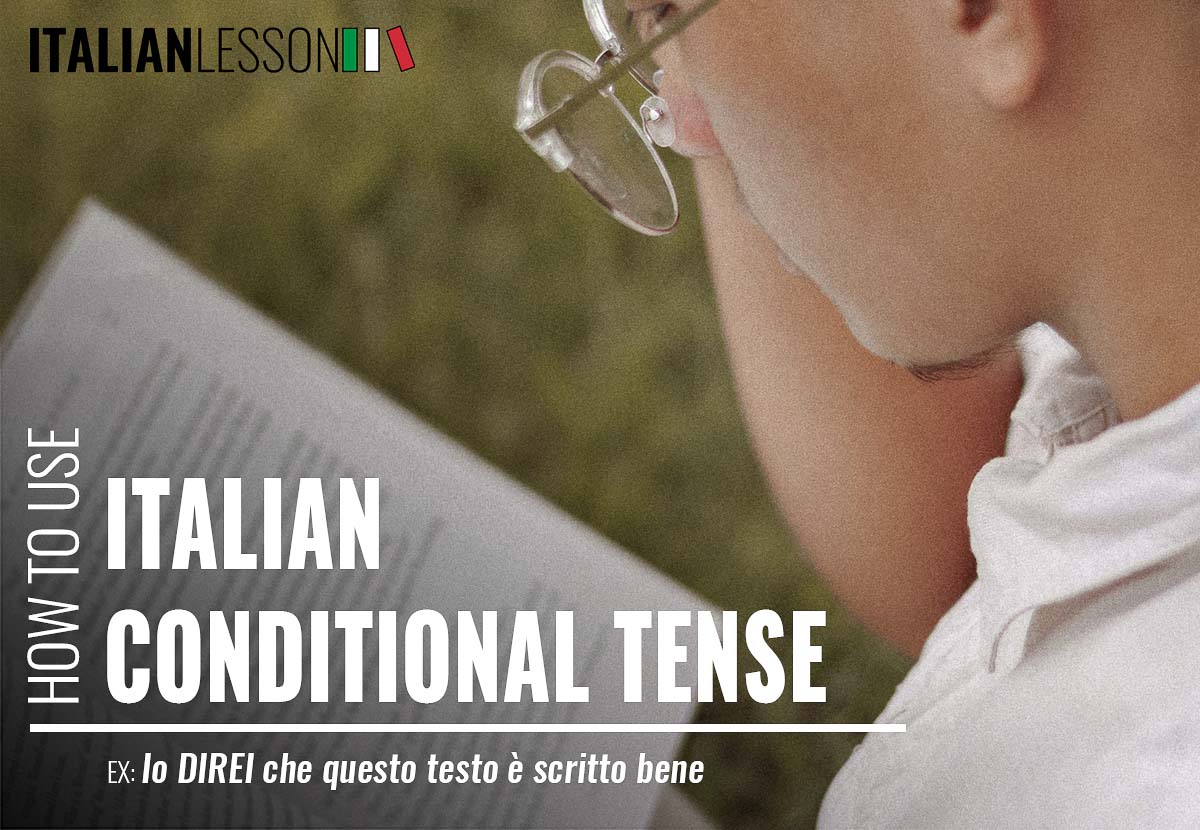
About the Italian conditional tense… are you ready for another Italian grammar lesson?
Well, add the word: CONDIZIONALE to your Italian vocabulary.
And guess what? This will be another opportunity to perfect your Italian pronunciation! I would dare to say that the Italian conditional tense is a romantic tense:
I would like to kiss you, I would like to take you to the sea, this tense expresses the desire to do something and is a very romantic way to make proposals, in Italian, really like a Latin lover!
Italian conditional tense
First of all, the Italian conditional tense is used to express:
- a desire:
Vorrei tanto essere più tranquilla / I would like to be calmer
- a doubt:
Dici che potrebbe funzionare? / You say it might work?
- a courtesy:
Mi scusi, potrebbe aprire la porta? / Excuse me, could you open the door?
- an opinion:
Io direi che questo testo è scritto bene / I would say that this text is well written
- an advice:
Ti consiglierei di pensarci di più / I would advise you to think about it more
Like any Italian verb conjugation, also in this case there are the present and past conditional:
- vorrei / I would like to (present)
- avrei voluto / I would have liked (past)
Although we have the three Italian conjugations, in the conditional the endings are the same for all of them.
Let’s see some examples for the three conjugations ARE – ERE – IRE: AMARE – SCRIVERE – DORMIRE
| AMARE | SCRIVERE | DORMIRE |
| Io amerei Tu ameresti Egli / Ella – Lui / Lei amerebbe Noi ameremmo Voi amereste Essi / Esse – Loro amerebbero | Io scriverei Tu scriveresti Egli / Ella – Lui / Lei scriverebbe Noi scriveremmo Voi scrivereste Essi / Esse – Loro scriverebbero | Io dormirei Tu dormiresti Egli / Ella – Lui / Lei dormirebbe Noi dormiremmo Voi dormireste Essi / Esse – Loro dormirebbero |
Amerebbe molto l’arte, se solo non gli ricordasse tanto quel periodo buio della sua vita. / He would love art very much, if only it did not remind him so much of that dark period of his life.
Gli studenti scriverebbero volentieri un testo per il teatro, se solo non avessero tanti compiti da fare. / Students would gladly write a text for the theater, if only they didn’t have a lot of homework to do.
Se non dovesse andare a lavoro, Marco dormirebbe tutto il giorno! / If he doesn’t go to work, Marco would sleep all day!
Did you think there were no irregularities? But no!
I present to you the irregularities of the verbs “to be” (ESSERE) and “to have” (AVERE)!
Don’t forget to learn them by heart!
| ESSERE | AVERE |
| Io sarei Tu saresti Egli / Ella – Lui / Lei sarebbe Noi saremmo Voi sareste Essi / Esse – Loro sarebbero | Io avrei Tu avresti Egli / Ella – Lui / Lei avrebbe Noi avremmo Voi avreste Essi / Esse – Loro avrebbero |
Sarebbero molto fortunati a sposarsi in quella chiesa! / They would be very lucky to get married in that church!
Non avrei mai il coraggio di dire bugie! / I would never have the courage to tell lies!
As you will have noticed, the Italian conditional tense corresponds to the English construction:
would + infinitive and indicate, both in the Italian and English tense, a condition.
Warning! the conditional is also used in the hypothetical period together with the subjunctive:
Se guadagnassi di più, mi comprerei un’automobile / If I earned more, I would buy a car
Here is a link to learn more:
https://it.wikipedia.org/wiki/Condizionale
In conclusion, an Italian verb can be expressed through many tenses! But that’s enough for today
See you soon!
